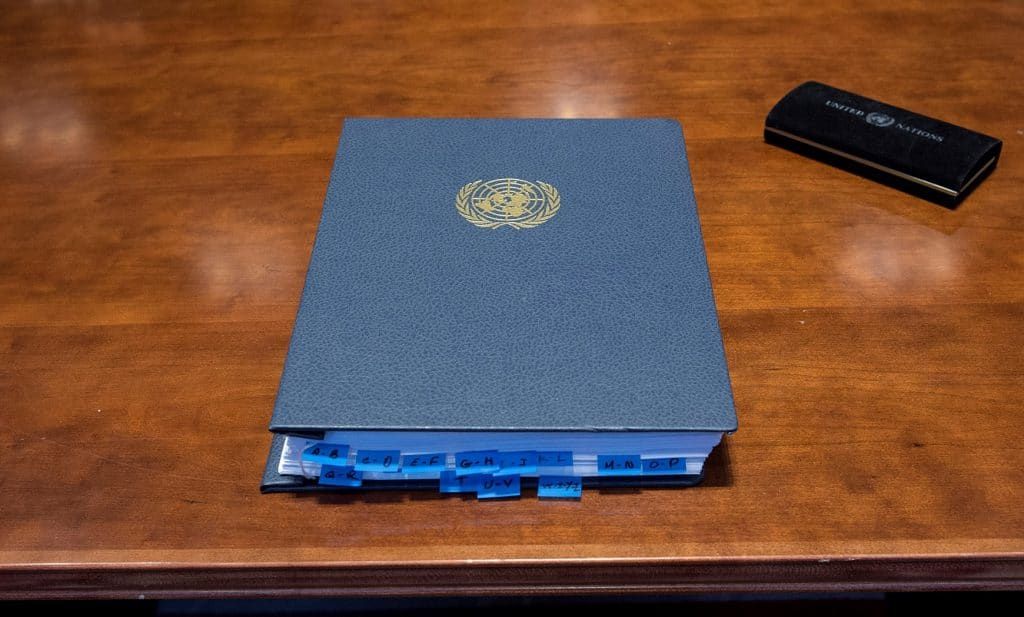Global nuclear policy is stuck in colonialist thinking. The ban treaty offers a way out.
By Molly Hurley | January 15, 2021
 The book of signatures at the signing ceremony for the Treaty on the Prohibition of Nuclear Weapons, September 20, 2017. UN Photo/Kim Haughton.
The book of signatures at the signing ceremony for the Treaty on the Prohibition of Nuclear Weapons, September 20, 2017. UN Photo/Kim Haughton.
The world recently reached a significant milestone on international nuclear weapons policy: The Treaty on the Prohibition of Nuclear Weapons—commonly called the nuclear ban treaty—hit 50 ratifications, triggering its entry in force on January 22, 2021. None of the 50 ratifications comes from a country with an actual nuclear arsenal. Nevertheless, as the name suggests, the ban treaty prohibits states party to it from developing, testing, producing, manufacturing, otherwise acquiring, possessing, or stockpiling nuclear weapons or other nuclear explosive devices. The treaty is a step in the right direction for those in the disarmament camp, but it is much more than that. While the current system regulating nuclear weapons is unstable, dangerous, and unfair to much of the world because it grew out of a colonial system, the ban treaty can help the world move in a less dangerous, post-colonial direction.
A post-colonial perspective on national security begins by overturning a number of currently held assumptions within the mainstream nuclear policy regime—one that is solely dedicated to nonproliferation and deterrence and lacks a genuine commitment to eventual disarmament. These assumptions are that exporting a Western values system, especially through military intervention, builds democracy and brings “civility” to Global South countries; that “might makes right,” and one country can impose its arms control demands on the rest of the world; that the West rightfully serves as the primary guardian and custodian of arms control and disarmament; and that nuclear weapons make the world safer, but only when certain countries possess them.
One of the principal benefits of the ban treaty is that it can help subvert these assumptions, opening a pathway toward a new, post-colonial conception of security.
“Civilizing” the Global South. The current system implicitly gives the United States the right to determine the validity of Global South countries’ form of government. For example, when the United States invaded Iraq in 2003, the George W. Bush administration posited that the necessity of this action stemmed not only from a concern for Iraq’s development of weapons of mass destruction, including nuclear weapons development, but also a concern for overthrowing Saddam Hussein and bringing democracy to the country.
Intelligence on the accusation of a nuclear weapons program was revealed to be murky at best and a complete lie at worst. As for the democracy pursuit, deeper analysis shows this to also be a cover. In reality, a primary motivator for the US invasion of Iraq was to demonstrate superiority as a world power. Secretary of Defense Donald Rumsfeld said in 2001 that taking down Saddam would “enhance US credibility and influence through the region” and “demonstrate what US policy is all about.” The sentiment grew particularly strong after 9/11, an event that President Bush felt was a humiliation on the part of US power and security. Although the claim for this underlying motivation is contested by some, Under Secretary of Defense for Policy Douglas Feith admitted in 2006 that “the rationale for the war didn’t hinge on the details of this intelligence, even though the details of the intelligence at times became elements of the public presentation.”
The misleading of the public aside, the very premise of the United States holding a responsibility to lead in the development of spreading “democracy” around the world is inherently racist, since it assumes those within a given country are incapable themselves of pursuing a more just society for their own people. In addition, even if a country is suffering from internal instability, bringing “democracy” and “civility” at the barrel of a gun contradicts the very values underpinning these aspirations. And last, as seen in the Iraq War, the “democracy” that Westerners claim to export is often far from the ideal as perceived in the public imagination.
In lieu of attempts to export the somewhat narrow-minded or misleading notions of democracy by US standards, each country’s own people ought to be able to decide upon and conceptualize “democracy” and “justice” for themselves.
Bringing it back to the ban treaty, the treaty shows that Global South does not need “civilizing,” since it was Global South countries that led the way in its negotiation and adoption. If anything, it’s the opposite: Article 12 of the treaty obligates state parties encourage other countries to join on, with the goal of universal adherence. So leaders like Nigeria, Mexico, and Bangladesh will now be working diplomatically to “civilize” the nuclear powers.
Might makes right. The second assumption of the current nuclear policy regime is that military aggression or interference is a critical centerpiece in bringing about peace and stability.
Just look at deterrence theory at its essence. Nuclear-armed countries have built the foundations of their security policies around nuclear arsenals and the principle of deterrence. Mutual assured destruction dominated the Cold War understanding of nuclear weapons and still underpins the concept of deterrence today. It’s a game of Russian roulette, but with all guns loaded and fingers on the trigger. Deterrence is built on the idea that with enough nuclear weapons no one will dare attack. Yet this belief is deeply flawed because it ignores the potential for misperception, accidents, and leaders who follow different decision-making calculuses. Deterrence theory is also a belief in the right of the five officially recognized nuclear weapon states under the Nuclear Non-Proliferation Treaty (China, France, Russia, the United States, and the United Kingdom) to have the power to threaten nuclear annihilation to force “peace” on the rest of the world.
How is the Treaty on the Prohibition of Nuclear Weapons different? Simply look at the course of the ban treaty from its early stages of development, to its adoption in 2017, and up to today.
The ban treaty came about from the Humanitarian Initiative, a series of discussions held by non-nuclear weapons states about the humanitarian consequences of nuclear possession and nuclear war. Participants also included members of civil society. All nuclear weapons states, most NATO members, and many military allies of nuclear weapon states boycotted the negotiations, which were chaired by Costa Rican Ambassador Elayne Whyte Gomez. Even in the lead up the treaty’s creation and adoption, the severe humanitarian consequences of nuclear weapons and their possible use was the focus, rather than their strategic capabilities as tools of war, and the discussions were led not by the UN Security Council but by those historically overlooked or ignored in nuclear policy discussions.
Currently, 50 countries have ratified (and 86 countries have signed) the treaty. Its entry into force in this month will signal a large shift in the international dialogue on the path to disarmament, giving a voice to the countries who have become party to the treaty and who would otherwise have been given small, if any, roles to play in the global affairs of nuclear policy.
The custodians of arms control. Following this, should the United States and other recognized nuclear weapons states just by virtue of possessing nuclear weapons get to be the sole decision makers in international nuclear policy and disarmament and nonproliferation efforts?
Consider the United States’ unilateral withdrawal from the 2015 Joint Comprehensive Plan of Action (JCPOA or, colloquially, the Iran deal) as a perfect example of how, under the current nonproliferation regime, one or just a few countries can impose their arms control will on the rest of the world. By pulling out of the deal without considering the concerns of the other signatories, the Trump administration demonstrated once more the belief in US primacy in the world, particularly on the topic of nuclear weapons, and a lack of multilateralism and diplomacy in the handling of international affairs. The Trump administration not only reimposed sanctions against Iran, but also imposed secondary sanctions against European, Russian, Chinese, and other companies that sought to do business in Iran, effectively punishing the rest of the world for upholding its original end of the agreement.
In addition, last fall, as the fiftieth ratification for the ban treaty neared, the United States made bold calls to countries already party to the treaty or those considering near-term ratification to withdraw their support for or their participation in the treaty altogether.
Movement toward dedicated, deliberative diplomacy, negotiation, and multilateralism not only runs counter to the current assumption of “might equals right” and US primacy but also leads to the creation of more nuanced, culturally-appropriate, and indigenous decision-making processes, in line with a post-colonial approach to national and international security. A return to multilateralism is a return to confidence-building and international cooperation toward a safer world.
Instead of the few nuclear “haves” dictating nonproliferation and disarmament policy to the rest of the world as they tried to do in their boycott of the meetings leading up the treaty’s adoption, the rest of the world can be the arbiters of our nuclear future. Adoption of the treaty by each country is an independent decision under each country’s sovereignty and right to freedom from nuclear threat and devastation. The treaty de-centers the historically Eurocentric idea of security by instead focusing on the development and defense of the “weak,” and not of Western great powers.
Nor does the United States get to serve as the custodian and gatekeeper of nuclear arms control under the ban treaty. The very process of joining the treaty exemplifies the shift in power. Under the current regime, when countries formally join the Nuclear Non-Proliferation Treaty, they deposit their accession to the United States, United Kingdom, and Russia. By contrast, when countries accede to the ban treaty, they deposit their accession to the UN Secretary-General. In a very literal sense, the Western countries are guardians of arms control under the current system, while the ban treaty envisions something quite different.
Whose nukes are safe? Finally, there is a strong streak of orientalism in US foreign and nuclear policy—a pattern in US rhetoric around Eastern versus Western powers and their nuclear arsenals or their purported attempts at attaining the power of a nuclear arsenal. Nuclear weapons make the world safer when in the hands of Western countries but are a dangerous threat in the hands of the Eastern or Global South countries.
Nuclear weapons are mighty and powerful for the United States, and nuclear deterrence is a legitimate and safe path for ensuring global peace. US nuclear forces “contribute uniquely to the deterrence of both nuclear and non-nuclear aggression,” says President Trump’s 2018 Nuclear Posture Review. But it also calls out Russian and Chinese activities as having “caused the international threat environment to worsen.” In a statement earlier this year, too, Ambassador Marshall Billingslea, Special Envoy for Arms Control, discussed China’s “destabilizing behavior” and it’s “worrisome” nuclear program: “What China is doing is not just a threat to the United States and our allies in the East and West, but it is a threat to global peace and security.” There is no mention of the United States’ own role, whose warhead stockpile is more than 10 times larger than China’s, in this global destabilization.
In Iran, North Korea, or China, nuclear weapons are or would be active threats to US sovereignty and national security. Moreover, America is stable and responsible, while Eastern countries are unstable, ready to collapse at any given moment, and so irresponsible and undeserving of wielding the power of a nuclear weapon. Former President George W. Bush referred to Iran, Iraq, and North Korea as the “axis of evil” in his 2002 State of the Union address. Newt Gingrich once claimed, “It’s impossible to deter [Iran’s leaders]” because Iranians are inherently irrational and would willingly launch a suicidal war against the United States or Israel. And, reports of imminent collapse in “unstable” North Korea or China abound.
This distinction between whose nuclear weapons are safe and whose are not is embedded in the Nuclear Non-Proliferation Treaty itself. India, Pakistan, and Israel have not even signed the treaty, with India in particular claiming that it creates a “nuclear apartheid.” It forbids countries other than the five designated nuclear weapons states from pursuing nuclear weapons development, as if they could never live up to the same level of responsibility as the nuclear powers established before 1968, when the Non-Proliferation Treaty opened for signature.
If Western policy makers can acknowledge the destabilizing effects of nuclear weapons possession by the East, then surely they can realize the destabilizing effects of their own arsenals. The ban treaty does this. It doesn’t call out just the Eastern countries for the role they play in nuclear hegemony and the oppression the world’s population faces, but all nuclear powers, both recognized and unrecognized.
A step in a post-colonial direction. Given this fallacy in the safety of nuclear weapons possession, whose security do these weapons actually prioritize? Whatever the answer, they certainly do not prioritize global security. A post-colonial security, by contrast, would do just that. It would focus on the humanitarian consequences of such policies and be sensitive to the multiplicity of different cultural conceptualizations of “humanity” and “security.” It would protect all humans, natures, and cultures from destruction.
A world free of nuclear weapons would surely be a more just world. No longer could a single nuclear-armed country threaten the sovereignty and very existence of another nation. No longer would another nation have to submit to the will of the nuclear hegemony.
Only time will tell whether the treaty’s entry into force on January 22, 2021 will rapidly jumpstart efforts toward global disarmament, or whether the nuclear “haves” will continue to resist. But regardless, the ban treaty can usher in a new, post-colonial understanding of nuclear weapons and their role in national security.
Together, we make the world safer.
The Bulletin elevates expert voices above the noise. But as an independent nonprofit organization, our operations depend on the support of readers like you. Help us continue to deliver quality journalism that holds leaders accountable. Your support of our work at any level is important. In return, we promise our coverage will be understandable, influential, vigilant, solution-oriented, and fair-minded. Together we can make a difference.
Keywords: TPNW, Treaty on the Prohibition of Nuclear Weapons, nuclear ban treaty, racism
Topics: Nuclear Weapons, Opinion, Voices of Tomorrow















